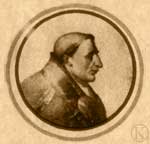POPE PAUL II
212TH Pope (1464-1471)

Home
Kolbe Library
Annals of Catholicism
(PIETRO BARBO)
Born at Venice, 1417; elected 30 August, 1464; died 26 July, 1471; son of Niccolo Barbo and Polixena Condulmer, sister of Eugene IV. Although he studied for a business career he received an excellent religious education and, at the elevation of his uncle to the papacy, entered the ecclesiastical state. He became Archdeacon of Bologna, Bishop of Cervia and of Vicenza, and in 1440 cardinal-deacon. Noted for his generosity and imposing appearance, the Cardinal of Venice, as he was called, was very influential under Eugene IV, Nicholas V, and Calixtus III, less so under Pius II. He became the latter's successor, and owed his election partly to the dissatisfaction of some of the cardinals with the policy of his predecessor. To this could be traced the oath which Barbo swore to at the conclave, but which he rightfully set aside after election, since it was opposed to the monarchial constitution of the Church. Paul II delighted in display. He introduced splendid carnival festivities, built the palace of S. Marco (now di Venezia), revised the municipal statutes of Rome, organized relief work among the poor, granted pensions to some cardinals, and to all the privilege of wearing the red biretta. His suppression in 1466 of the college of abbreviators aroused much opposition, intensified by a similar measure against the Roman Academy. Platina, a member of both organizations, who had been repeatedly imprisoned, retaliated by writing a calumnious biography of Paul II.
That Paul II was not opposed to Humanistic studies, as such, is evidenced by the fact that he protected universities, encouraged the art of printing, and was himself a collector of works of ancient art. The suppression of the Roman Academy was justified by the moral degeneracy and pagan attitude which it fostered. On the other hand the charge of immorality brought against Paul II by Gregory of Heimburg is untenable. The pope punished the Fraticelli in the Papal States, prosecuted heretics in France and Germany, decreed in 1470 the observance of the jubilee every twenty-five years, and made an unsuccessful attempt at uniting Russia with the Church. The Turkish question received his earnest attention, particularly after the fall of Negropont (1470). Financial assistance was granted to Hungary and the Albanian leader Scanderbeg. No general results were obtained, however, owing to the lack of co-operation among the Christian powers; to disturbances in the Papal States, where Paul II suppressed the robber knights of Anguillara, and perhaps chiefly to the conflict between the papacy and King George Podiebrad of Bohemia.
|



